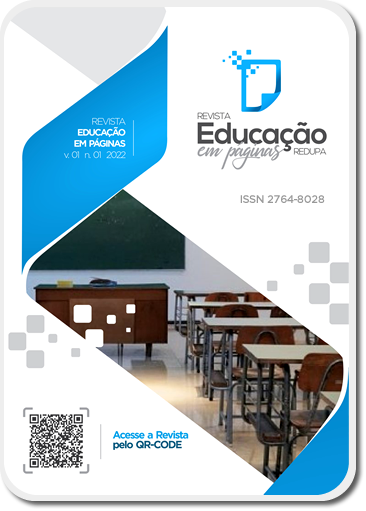Learning difficulties in mathematics: perception of teachers when they were students
DOI:
https://doi.org/10.22481/redupa.v1.11720Keywords:
learning disabilities in mathematics, risk factors, environmental factorsAbstract
Part of the issues associated with difficulty in learning mathematics is linked to factors external to the individual learner. The objective of this research was to access the memories of teachers from the early years and identify the perception of risk factors that caused learning difficulties in mathematics at the time they were students. For that, the teaching methods, the teacher's training and conduct, the relationship with mathematics and the personal and school affective history recalled by the research subjects were observed. Within a qualitative approach, we applied a questionnaire to 45 teachers in the early years of the municipal public education network in Jequié. From the testimonies of the teachers, who declare having a history of difficulty in mathematics during their student trajectory, data were analyzed that indicated that the difficulties in mathematics attributed by the participants refer to the teaching methods, the incongruity and nonconformity of school mathematics with everyday life, the lack of support and appreciation for the discipline as a result of stereotyped cultural constructions of mathematics, among other causes.
Downloads
References
CARRAHER, Terezinha Nunes; CARRAHER, David William; SCHLIEMANN, Analúcia Dias. Na vida dez, na escola zero. São Paulo: Cortez, 1997.
CHACÓN, Inés Maria Gómez. Matemática emocional: os afetos na aprendizagem matemática. Porto Alegre: Artes Médicas, 2003.
CORRÊA, Crístia Rosineiri Gonçalves Lopes. A relação entre desenvolvimento humano e aprendizagem: perspectivas teóricas. Psicologia Escolar e Educacional, v. 21, n. 3, p. 379–386, dez. 2017. https://www.scielo.br/j/pee/a/yZmjRzBCCsdJXWQ37ZLtt9M/
JOSE, Elisabete da Assunção; COELHO, Maria Teresa. Problemas de aprendizagem. 9. ed. São Paulo: Ática, 2008. 9. ed. São Paulo: Ática, 2008.
LURIA, Aleksandr Romanovich. Fundamentos-de-Neuropsicologia. São Paulo: USP, 1981. http://fisio2.icb.usp.br:4882/wp-content/uploads/2016/02/LURIA-A-R-Fundamentos-de-Neuropsicologia.pdf
MARTURANO, Edna Maria. Crianças em risco - desenvolvimento e prevenção. Programa e Resumo apresentado em I Jornada de Saúde Mental da Criança. FMRP/USP, 2000. https://repositorio.usp.br/single.php?_id=001074293
MAUGHAN, B.; GRAY, G.; RUTTER, M. Reading retardation and antisocial behavior: a follow-up into employment. Journal of Child Osychology and Psychiatry., p. 741–758, 1985. https://pubmed.ncbi.nlm.nih.gov/4044719/
MOURÃO JUNIOR, Carlos Alberto; MELO, Luciene Bandeira Rodrigues. Integração de três conceitos: função executiva, memória de trabalho e aprendizado. Psic.: Teor. e Pesq., Brasília, v. 27, n. 3, p. 309-314, Sept. 2011. https://www.scielo.br/j/ptp/a/6DKfm4zCwjc6QRtrXGqjGtQ/abstract/?lang=pt
MIORIM, Maria Angela. Introdução à história da educação matemática. São Paulo: Atual, 1998.
MORAES, Katiuce da Silva Barreto Fernandes. Percepções de professores sobre suas dificuldades em matemática durante sua trajetória escolar: atribuição de causas e estratégias de enfrentamento. Dissertação (Mestrado)-Bahia: Universidade Estadual do Sudoeste da Bahia, 2019. http://www2.uesb.br/ppg/ppgecfp/wp-content/uploads/2019/06/DISSERTACAO-DE-KATIUCE-Mest.-Educa%C3%A7%C3%A3o_UESB_30-maio-2019.pdf
OLIVEIRA, Claudia Eunice Neves de; SALINA, Maria Elisabete; ANNUNCIATO, Nelson Francisco. Fatores ambientais que influenciam a plasticidade do SNC. Acta Fisiátrica, v. 8, n. 1, p. 6–13, 2001a. https://www.revistas.usp.br/actafisiatrica/article/view/102269
PAÍN, Sara. Diagnóstico e tratamento dos problemas de aprendizagem. 3. ed. Porto Alegre: Artes Médicas, 1989.
POLETTO, Michele; KOLLER, Sílvia Helena. Contextos ecológicos: promotores de resiliência, fatores de risco e de proteção. Estudos de Psicologia (Campinas), v. 25, n. 3, p. 405–416, set. 2008. https://www.scielo.br/j/estpsi/a/DycNK6BKd8jJmr5rmJk8P9D/?lang=pt&format=pdf
ROTTA, Newra Tellechea; OHLWEILER, Lygia; RIESGO, Rudimar dos Santos. Transtornos da Aprendizagem: Abordagem neurobiológica e multidisciplinar. 2 ed ed. Porto Alegre: Artmed, 2016.
SAMPAIO, Simaia; FREITAS, Ivana Braga de. Transtornos e dificuldades de aprendizagem: entendendo melhor os alunos com necessidades educativas especiais. Rio de Janeiro: Wak, 2011.
SARAVALI, Eliane Giachetto. A interação social das crianças com queixa de dificuldades de aprendizagem: reflexões para professores e psicopedagogos. Revista Psicopedagogia, v. 21, n. 66, p. 9, 2004. https://cdn.publisher.gn1.link/revistapsicopedagogia.com.br/pdf/v21n66a04.pdf
SILVA, Marcelo Carlos da. Dificuldades de aprendizagem: do histórico ao diagnóstico. Psicologia.com.pt, 28 mar. 2018. https://www.psicologia.pt/artigos/ver_artigo.php?codigo=a0408
SILVA, Erondina Barbosa da. O impacto da formação nas representações sociais da matemática – o caso de graduandos do curso de pedagogia para início de escolarização. Dissertação (Mestrado) - Brasília: Faculdade de Educação da Universidade de Brasília, 2004.
SMITH, Corinne; STRICK, Lisa. Dificuldades de aprendizagem de A a Z. Porto Alegre: Artmed, 2001.
TOLEDO, Marília; TOLEDO, Mauro. Didática de matemática: como dois e dois. São Paulo: FTD, 1997.
WEISS, Maria Lúcia Lemm. Psicopedagogia clínica: uma visão diagnostica dos problemas de aprendizagem escolar. 12. ed. Rio de Janeiro: 2007.
Downloads
Published
How to Cite
Issue
Section
License
Copyright (c) 2022 Katiuce da Silva Barreto Fernandes Moraes, Tânia Cristina Rocha Silva Gusmão

This work is licensed under a Creative Commons Attribution 4.0 International License.












